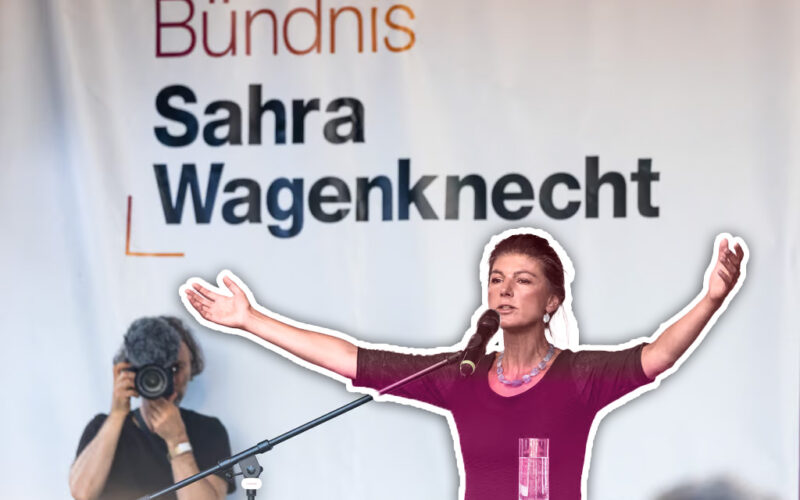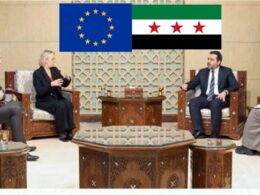Sahra Wagenknecht – the far-left “friend of Putin” and current leader of the newly created Sahra Wagenknecht Alliance (BSW) party (previously the member of the left-wing Die Linke party) is one of the most consistent critics of supporting Ukraine in its struggle against Russian aggression within Germany. Her popularity among voters continues to grow, posing a serious obstacle to European support for Ukraine.

After splitting from the established far-left Die Linke party to form BSW seven months ago, Wagenknecht has emerged as the left’s disrupter-in-chief. CDU leader Friedrich Merz has described the BSW as “right-wing extremist on some topics and left-wing extremist on others”, given the party’s odd mix of economically left-wing and socially conservative views.
Wagenknecht has already made a mark with her anti-Ukrainian influence on German politics and serving Russian interests. She has claimed responsibility for the government’s decision to limit military aid to Ukraine, stating that her strong opposition to arming Ukraine is influencing Berlin’s policy on the war. In an interview with The Financial Times, Wagenknecht remarked that the fact that the German government “at least said it doesn’t want to continue weapon deliveries” was “a result of our high opinion poll ratings.”
Germany’s finance minister, Christian Lindner, has warned of a possible veto on new funding requests for Ukraine, which could significantly complicate Ukraine’s efforts in fighting off Russian invasion.
Wagenknecht openly stated, “We are already having an effect, even though we’re not in power… Our approval ratings are affecting the national debate.”
Wagenknecht is among the few politicians who openly criticize military support for Ukraine. She has repeatedly stated that she will not cooperate with any party that supports Chancellor Olaf Scholz’s plan to station American medium-range missiles in Germany from 2026. Her position is clear: “BSW will only join a government that explicitly backs diplomatic efforts to end the war in Ukraine.”
This stance is particularly dangerous for Ukraine, as Wagenknecht is gaining increasing support among the German population, especially in the eastern regions of the country. Her party is rising in popularity against the backdrop of the growing far-right Alternative for Germany (AfD), which also holds pro-Russian views. This creates a serious threat to the political consensus in Germany, which has so far been directed at supporting Ukraine.
The rise in popularity of Wagenknecht and her party, particularly in Saxony and Thuringia, where BSW has 13% and 18% support, respectively, is a worrying sign. Political observers are already discussing her potential influence on coalition formations in these regions, which could lead to a shift in Germany’s foreign policy.
Criticism of Wagenknecht from human rights activists and political opponents has not been slow to emerge. She has been accused of spreading Kremlin disinformation and attempting to “blackmail” her potential coalition partners, particularly the CDU, which has traditionally supported Ukraine. However, Wagenknecht remains steadfast, claiming that she is merely “reflecting the wishes of voters” in Eastern Germany, who fear an escalation of the conflict, a world war or a nuclear strike.
In June of this year, she decided to boycott President Volodymyr Zelenskyy’s speech in the Bundestag, further cementing her reputation as one of Germany’s leading from The German club of “Putinunderstanders” in Germany.
She criticized the Ukrainian offensive in Kursk, stating that it would “harden” the positions of the warring parties, and claimed that the war only occurred because Russia “wouldn’t accept Ukraine turning into an American military outpost.” that strongly corresponds to what Russian propaganda narratives sound like.
While governments of other EU countries continue to increase military aid to Ukraine, Wagenknecht’s influence presents a formidable challenge to European unity in supporting Ukrainians for its fight for democracy. This support is not only a matter of defending Ukraine’s sovereignty but also about upholding democratic values and the rule of law, which are core principles of European unity.
Sahra Wagenknecht is becoming not just a political “disrupter” in Germany but a real threat to Ukraine. Her growing influence on German politics could have far-reaching negative consequences for European security and the future of Ukrainian-European relations.








